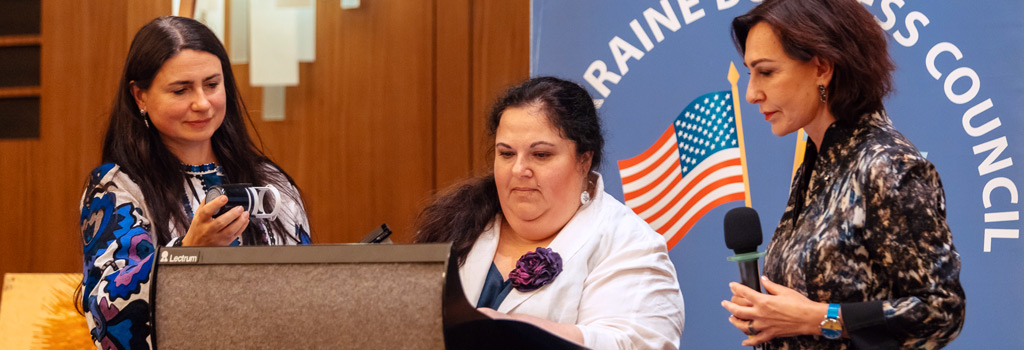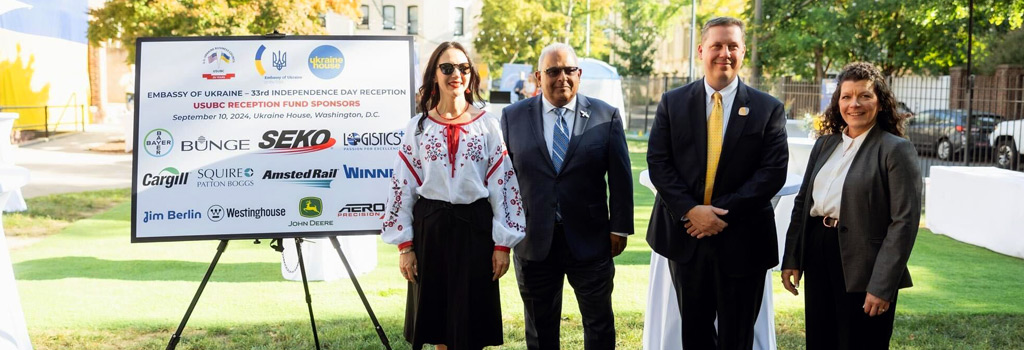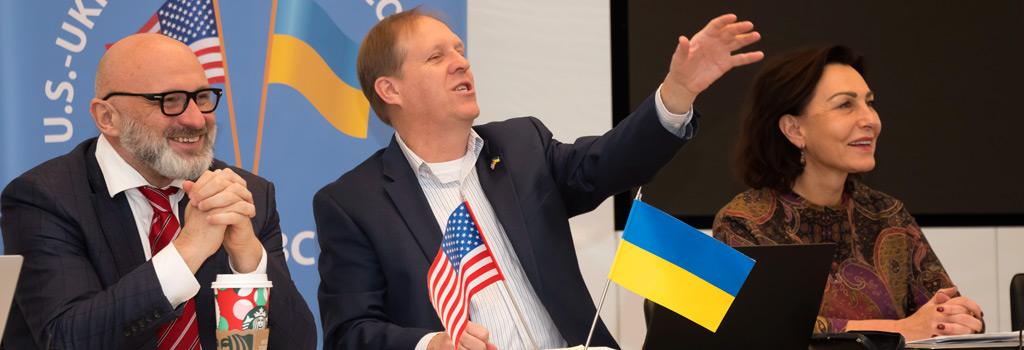Featured Galleries USUBC COLLECTION OF OVER 160 UKRAINE HISTORIC NEWS PHOTOGRAPHS 1918-1997
 Holodomor Posters
Holodomor Posters

Belarus and Russia's War on Ukraine
 By Orest Deychakiwsky
By Orest Deychakiwsky
Ukrainian Weekly, Fri, Aug 26, 2022
Orest Deychakiwski is a Senior Advisor of the U.S.-Ukraine Business Council (USUBC)

A protester in support of Ukraine in London in March 2022. Photo: Vuk Valcic/SOPA Images/REX/Shutterstock
In thinking about Russia’s war against Ukraine, it is a mistake to equate the Belarusian people with the country’s long-time dictator, Alyaksandr Lukashenka. And it is important to recall the unprecedented eruption of massive Belarusian pro-democracy demonstrations that began two years ago.
No doubt, Belarus’ illegitimate leader is Russian President Vladimir Putin’s accomplice in the war that has wreaked so much death and destruction. Belarus is a co-aggressor state. Its armed forces are not themselves fighting in Ukraine, although, unfortunately, Russia has reportedly recruited thousands of Belarusian volunteers to fight on its side, most of whom are doing it for money rather than out of conviction.
Belarus was a staging ground for Russian forces to invade Ukraine in the early phase of the war, providing the shortest land route to attack Kyiv.
The Russian military continues to use Belarusian territory to attack Ukraine. Recent satellite images indicate an increasing number of flights from Russia to Belarusian airfields with equipment that could be used in air-raids. Given Belarus’ proximity to Kyiv and western Ukraine, through which a great deal of Western aid flows, this poses a serious threat.
But don’t conflate the people of Belarus with the Lukashenka regime.
According to surveys, Belarusians are largely opposed to the war, with only a tiny fraction supporting Belarus’ direct involvement in Ukraine. They want nothing to do with it, and those polls show they are convinced that the war will only have negative consequences for their own country.
Indeed, many Belarusians are actively supporting Ukraine, risking their well-being and lives. Some 1,500 Belarusian volunteers are fighting alongside the Ukrainian military. They include the Belarusian Regiment of Kastus Kalinouski – named after a 19th century Belarusian writer and revolutionary who led an 1863 uprising against the Russian Empire.
The fighters fully realize that by backing Ukraine they are also ultimately defending their own country’s freedom and independence. Their ranks are growing.
Other Belarusians have actively opposed the war from within Belarus, notably the so-called “railway partisans.” These Belarusian patriots disabled or disrupted railway links in Belarus, stalling the movement of Russian troops and military supplies into Ukraine. Some have recently received harsh sentences. Other Belarusians provided valuable military information. These actions no doubt complicated the Russian assault on Kyiv.
The democratic opposition, led by Svitlana Tsikhanouskaya, the true winner of the fraudulent August 2020 presidential elections, is firmly on the side of Ukraine, recognizing that the fates of Belarus and Ukraine are inextricably linked. On August 9, the second anniversary of the elections, the Belarusian opposition formed the United Transition Government – in effect, a government-in-exile – with the goals of an independent, sovereign and democratic Belarus. A key task is to mobilize and increase support for Ukraine.
Many Belarusians feel a close kinship with Ukrainians. The two peoples have a shared history. Both trace their heritage to Kyivan Rus’. Both have far greater legitimate claim to this ancient polity than does Russia, despite warped Russian attempts to appropriate its history.
Belarus and much of Ukraine were part of the Grand Duchy of Lithuania and later the Polish-Lithuanian Commonwealth. The (Old) Ruthenian language, predecessor to modern Ukrainian and Belarusian, was an official language. Both peoples have far more in common linguistically, culturally and historically with each other than they do with Russia. With the expansion of the Tsarist empire into both countries in the 1700s came centuries of repression and Russification, which continued under brutal Soviet rule. The late-1930s killing fields in Bykivnia near Kyiv and Kurapaty near Minsk are powerful symbols of Moscow’s efforts to destroy the “enemies of the people” in both countries. Belarusians – certainly Mr. Lukashenka’s many opponents – realize that Russia is a common enemy to both Belarus and Ukraine.
Since becoming independent in 1991, Ukraine and Belarus have gone on separate tracks. Ukraine is a democratic, pluralistic country where basic rights and freedoms are respected, while Belarus, except for the first three years following independence, became a repressive dictatorship following the election of Mr. Lukashenka as president in 1994.
Every single election under the dictator’s rule has been fraudulent – something I personally witnessed, having observed all but one national election during my tenure at the U.S. Helsinki Commission. The one I missed was because the Belarusian government denied me a visa because of my involvement with Congressional legislation sanctioning the regime and providing assistance to the beleaguered democratic opposition and civil society.
Post-election protests – and subsequent crackdowns, notably, the brutal post-2010 election crackdown – have been commonplace throughout Mr. Lukashenka’s rule. None of the protests, however, ever approached the scale and perseverance of those held following the August 9, 2020, presidential election.
The vote fraud in that election was so flagrant that most Belarusians were convinced that the real winner was Ms. Tsikhanouskaya. The democratic world recognizes that she represents the Belarusian people, and she has been warmly received at the highest levels in the United States and much of Europe.
Mass unprecedented peaceful rallies, occasionally exceeding 100,000 people, lasted for months, despite the torture, abductions and detentions of thousands of people. Ultimately, the protestors were no match for a system that had long honed its repressive machine. In the two years since, the Lukashenka regime has continued and even intensified its crackdown on civil society activists, independent media and other dissenting voices – including those who have opposed the war Ukraine. Today, more than 1,200 political prisoners languish in Belarusian prisons.
Despite his ostensible fealty to Russia, even Mr. Lukashenka has long resisted efforts to be absorbed by Russia because doing so would mean a loss of his own hold on power. He and Putin reportedly cannot stand each other. But thanks to the lack of political and economic reforms throughout his 27-year rule, he has made Belarus vulnerable to Russia. For this, he has nobody to blame but himself. Mr. Lukashenka is in a trap of his own making. This dependency has only grown in the last two years. Indeed, if it weren’t for Putin’s backing, the Belarusian autocrat would likely have lost his grip on power following the 2020 mass protests.
Thus far, Mr. Lukashenka has resisted Putin’s considerable pressure to overtly join the invasion of Ukraine. He well understands that the Belarusian people oppose it, and that his own military – especially the rank-and-file – have no desire to get involved. Given his own lack of legitimacy among Belarusians and the considerable, even if now largely suppressed or exiled opposition, Mr. Lukashenka sees the potential threat to his own rule should Belarus decide to more extensively participate in the war.
It is vital that Ukrainians and their friends and allies in the West make the distinction between the Lukashenka regime and the long-suffering Belarusian people who seek a free and democratic future. The Ukrainian government needs to embrace Belarus’ legitimate, democratic opposition which knows that a Russian defeat in Ukraine will mean liberation from the tyrannical Lukashenka regime and bring the Belarusian people closer to freedom at home.
The United States and its Western partners must continue to stand with the people of Belarus. The West imposed stricter sanctions following the 2020 election and massive crackdown, and further expanded sanctions for its role in Russia’s invasion. The West needs to continue its assistance to those seeking democratic change in Belarus and to those who defend its sovereignty. Both Ukraine and the West need to cooperate with the Tsikhanouskaya-led United Transition Government as much as possible.
The Belarusian people are Ukraine’s natural allies in the fight against Russian imperialism. It is they who represent the future of Belarus, not Putin’s puppet, Mr. Lukashenka. Supporting the Belarusian people’s fight for freedom is the smart thing to do, and the right thing to do.
LINK: Belarus and Russia’s War on Ukraine – The Ukrainian Weekly (ukrweekly.com)
NOTE: Orest Deychakiwsky is a Former Policy Advisor for Belarus, Bulgaria, Moldova, Romania, and Ukraine at the U.S. Helsinki Commission (Commission on Security and Cooperation in Europe) and serves a Senior Advisor for the U.S.-Ukraine Business Council (USUBC).

















